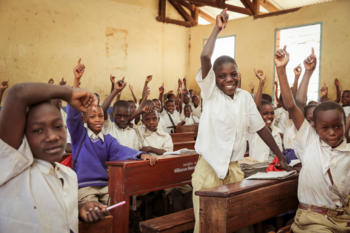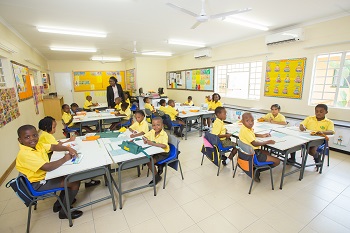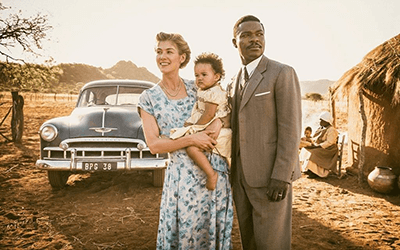The Incredible True Story of Diamonds & Botswana
Of all the countries blessed with diamond deposits, the landlocked African nation of Botswana, which borders on Namibia, Zimbabwe and South Africa, is the most blessed. As one of the world’s top producers of gem quality diamonds in terms of carat weight and value, Botswana has skillfully used its diamond wealth over the past 45 years to enhance health, education and environmental welfare more than any other diamond producing nation. In Botswana, government, private sector businesses, non-profit organizations and educators collaborate with the diamond industry to continuously create and enhance life-changing educational opportunities to the country’s youth.
“Through ethical leadership and wise management of Botswana’s diamond resources, the nation has thrived politically and economically as the oldest democracy in Africa with one of the region’s fastest growing economies,” notes Nancy Orem Lyman, Executive Director and Vice-President of the non-profit Diamond Empowerment Fund (D.E.F.). “By helping provide citizens with broad based access to education, healthcare, and world class infrastructure, the Botswana diamond industry creates what the D.E.F. refers to as a ‘diamonds do good’ impact.”

Co-founded in 2007 by Russell Simmons, De Beers, and other diamond industry leaders, D.E.F. works to foster cultural enrichment and educational opportunities in diamond communities. In Botswana, D.E.F. partners with the Top Achievers Program, which is administered through Botswana’s Ministry of Education and Skills Development. This project provides top high school students the opportunity to study at a university of their choice, worldwide. According to Orem Lyman, “The Botswana Top Achievers program is far-sighted in that it affords students from across the country to pursue higher education degrees that are of strategic importance in terms of driving the economic diversification and sustainable growth agenda for Botswana.” Scholarship fields of study include Finance, Business, Engineering, Medical Health, ICT, and Science. To its credit, D.E.F has supported the Top Achievers program with over $740,000 in donations since 2011.
Any discussion of Botswana’s diamond industry must include its environmental sustainability and monitoring efforts, which along with water recycling and conservation, also include implementing measures to protect the fragile Kalahari desert and its wildlife. Leased mining lands help maintain biodiversity by providing habitat and wildlife corridors for endangered species such as cheetahs and rhinos. Mining companies remedy environmental impact by backfilling mines with earth so that the area can be used for farming or other purposes after the mine is tapped out.

With 2.25 million citizens in a country roughly the size of France, democratically-governed Botswana has synergized ethical governance with efficient diamond mining, sorting, polishing and marketing since its first mines opened in 1971. With a per capita gross domestic product (GDP) of approximately $6,788, Botswana’s average wages are now among the highest in Africa. Diamond revenues account for over 60% of Botswana’s export revenue and nearly 25% of GDP. What’s more, Botswana boasts the world’s richest diamond mine, the Jwaneng, which is owned as a joint venture between De Beers and the government of Botswana. The Jwaneng mine’s current production output is about 10.6 million carats per year, which equals 4629.708 pounds, or slightly more than 2,100 kilos.
Improving literacy in Botswana and other African countries is one of the key goals of the FACET (For African Children Every Time) foundation. FACET is the brainchild of the London-based Laurence Graff, who has single-handedly built a leading international jewelry empire in just one generation through his London-based Graff Diamonds. While some compare Graff to the Harry Winston of the 21st century, the self-made billionaire is actually far more successful and socially conscious. As Graff once told the Financial Times, “We are very involved in various parts of Africa and have taken their treasure—now I want to give something back.”

Graff, who founded FACET in 2008 explains, “Across southern Africa, we see the devastating impact of poor health and a lack of basic education on the life chances of disadvantaged children and young people.” Through FACET, he continues, “We work with local partners to develop targeted programs designed to improve standards of health, education and well-being. Since establishing the Foundation in 2008, we have made a tangible impact with programs in Botswana, Lesotho and South Africa.”
FACET also works with the non-profit Stepping Stones International (SSI), a public-private collaboration that has been positively transforming lives since 2011. In that year, SSI welcomed community partners and supporters to the newly built Graff Leadership Centre (GLC) in Mochudi, a short distance from Gabarone, Botswana’s capital city. Constructed with support from the FACET Foundation, the GLC leverages SSI’s existing model of leadership, life skills, psychosocial support and community mobilization to teach orphaned and vulnerable youth how to become socially and financially autonomous, thriving individuals. The GLC’s “Finding the Leader Within” program educates youth in gender equality, communication skills, community and world issues, career guidance, networking for career placements and personal branding.
“Botswana embodies the essence of ethical, environmentally sustainable and socially beneficial diamonds,” says designer Stella Flame of Stella Flame Jewelry. “They are that much more beautiful and valuable because of their ethical provenance.”
source: https://realisadiamond.com/diamonds-good-botswana/